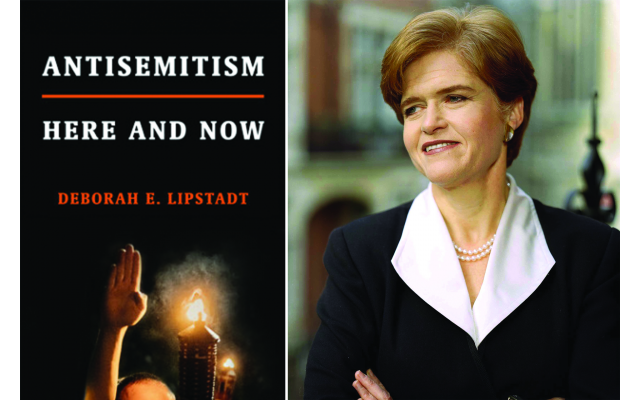Lipstadt’s New Book on Anti-Semitism’s Perfect Storm
Reading Deborah Lipstadt’s new book, “Antisemitism: Here and Now” is like being in a class taught by the famed Emory University professor.
Reading Deborah Lipstadt’s new book, “Antisemitism: Here and Now” is like being in a class taught by the famed Emory University professor. Like her, it speaks directly to the point and is clearly stated. In a way, it reflects her image as the scrappy defendant in the trial of Holocaust denier David Irving, which was the subject of the 2016 film “Denial,” starring Rachel Weisz.
Nonetheless, she writes about the emotionally charged subject dispassionately as she herself notes and gives us a picture of anti-Semitism in the world today, with 28 pages of footnotes to back up her quotes and statistics. If you’ve ever wanted to have Professor Lipstadt as your professor but couldn’t make it to Emory, buy the book, which comes out Tuesday, Jan. 29.
In recent conversations we touched on the changes in contemporary anti-Semitism that she writes about in her new book.
AJT: What’s new about anti-Semitism today?
Lipstadt: I think what we see today is both very much the same and very different. It’s the same emphasis in anti-Semitism on money, on power, on the various uses of that power, and conspiracy theories. In essence, the template of anti-Semitism remains the same. What’s different is we’re seeing what I would describe as a perfect storm: anti-Semitism on the right, anti-Semitism on the left and in sectors of the Muslim community. And on top of that, we are in an era right now where the level of discourse, what people can say, is so low that that, too, is enhancing the danger.
AJT: In your book you quote the anti-Semite Richard Spencer, who says ‘I love Israel, but I hate the Jews.’ Is this something new?
Lipstadt: Yes, yes, yes. This is happening. It’s a right-wing phenomenon. I think it’s going to evolve and become stronger. People who are overt anti-Semites like Richard Spencer, who says ‘I love Israel because, look, it is the ethno-state that we want to create here in America. The Jews have done it, they have a Jewish state, why can’t we have a white Christian state here in America?’ It’s very weird. It’s very, very weird.
AJT: Should we hold the government of Israel more accountable for its actions?
Lipstadt: Israel is a Jewish state and it cares about Jews worldwide. But I object to certain behaviors of the current Israeli government toward anti-Semites … If you’re going to say that anti-Semitism worldwide is something that is of concern to you, and you feel yourself one of the protectors of Jews worldwide, then you don’t support [Hungarian] Prime Minister Viktor Orbán, who has run overtly anti-Semitic campaigns in Hungary, or the Polish government, which has put into effect a law that calls for rewriting the history of the Holocaust. You don’t overlook that. You don’t embrace them. You don’t say to Viktor Orbán: ‘You are a great fighter against anti-Semitism.’ He’s not. I’m sorry. It just doesn’t work.
AJT: Your book went to the printer before the murders at the synagogue in Pittsburgh in October, so you didn’t have an opportunity to comment on them. Do they change anything you said in your book?
Lipstadt: I don’t think I would say anything different. Pittsburgh shocked me, but it didn’t surprise me. There was nothing in Pittsburgh that I hadn’t described in the book.
AJT: You speak a lot in your book about the how of anti-Semitism in recent years. What would you say about the why of anti-Semitism in recent years?
Lipstadt: Anti-Semitism is like a virus that lies dormant. When there is some sort of stress in society, and when people need someone or something to explain or blame for a crisis that is facing them, they will often turn to anti-Semitism. Because it’s something that’s familiar.
If you have grown up in the Western world, it’s in the oxygen we live and breathe. So I think there have been fractures in society. There have been economic stresses, immigration, nationalism, etc. And there has been also in the past two, three years a climate where this extremist kind of talk and the rhetoric I was referring to earlier is more acceptable, so it has come together in what I was calling a perfect storm.
AJT: And is there perhaps a lack of national leadership?
Lipstadt: In many countries national leadership is willing to accept this. Here in America I am not saying the president is an anti-Semite. I don’t think that is the issue. But anti-Semites on the right and extremists on the right think that he is, yes.




comments